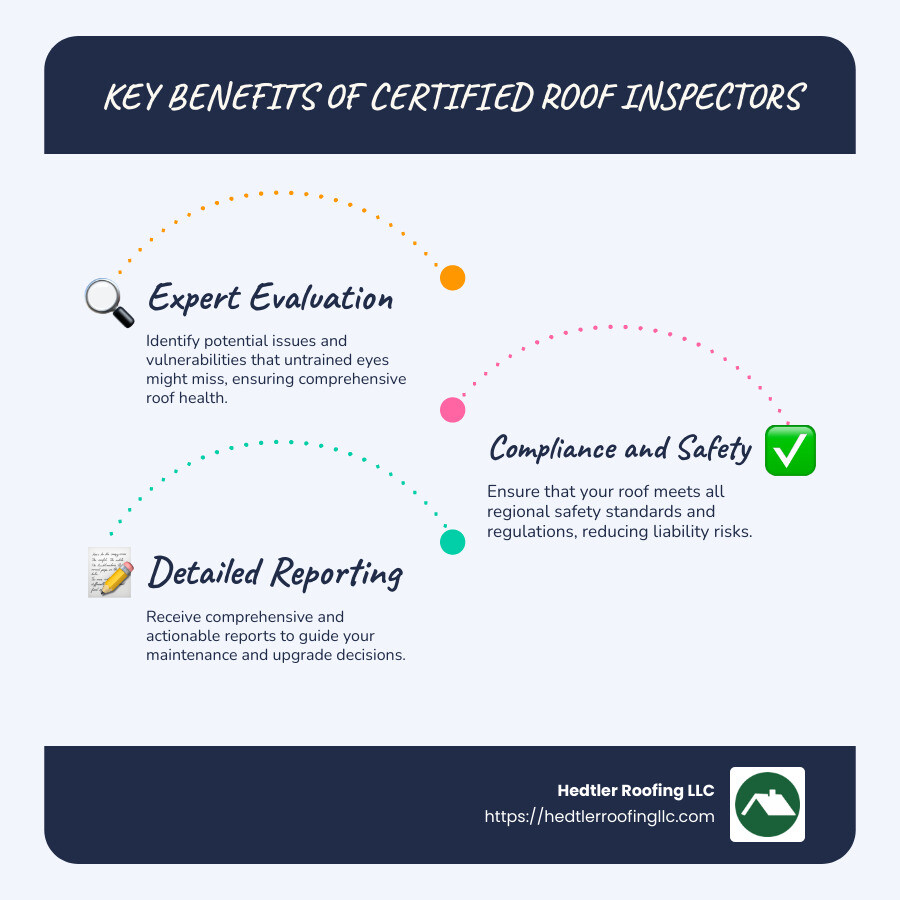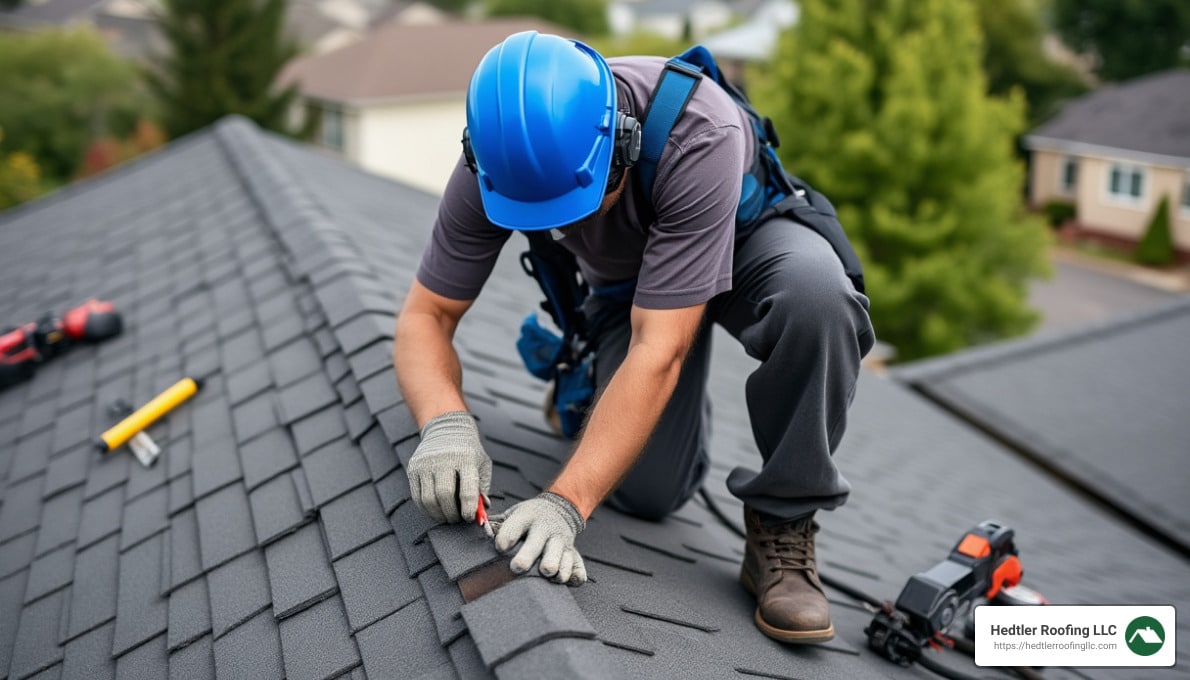Certified Roof Inspectors: Top 5 Essential Tips 2024
Certified roof inspectors play a crucial role in maintaining the safety and longevity of your home, especially when dealing with the unpredictable Massachusetts weather. These professionals ensure that your roof is not just a cover but a well-protected and problem-free part of your home. Here’s why choosing certified roof inspectors is essential:
- Expert Evaluation: Certified inspectors are trained and experienced in detecting issues that others might miss.
- Compliance and Safety: They ensure your roof meets all local regulations and safety standards.
- Detailed Reporting: Expect comprehensive reports that guide you in making informed decisions about your roof’s upkeep.
- Peace of Mind: With certification, you can trust that the inspections are reliable and thorough.
With over 20 years of experience in the roofing industry and as the owner of Roof Experts, I, Jason Hedtler, have seen the benefits of working with certified roof inspectors. Whether it’s ensuring compliance or enhancing your home’s value, certified inspectors are indispensable.

Glossary for certified roof inspectors:
– how to inspect a roof
– roof inspection checklist
– roof inspection for insurance
Understanding Roof Inspections
Roof inspections are a vital part of home maintenance, especially in areas like Massachusetts where weather conditions can be harsh. Understanding the inspection process helps homeowners better prepare and maintain their roofs.
Inspection Process
A roof inspection involves a detailed evaluation of your home’s roof system. Certified roof inspectors follow a structured process to ensure nothing is overlooked. Here’s a simple breakdown of what typically happens:
- Visual Examination: Inspectors start by visually examining the roof from the ground and then up close. They look for obvious signs of damage, such as missing shingles or visible wear.
- Structural Assessment: They assess the structural integrity of the roof, checking for sagging or uneven rooflines which could indicate underlying issues.
- Material Inspection: Inspectors examine the roofing materials for any signs of deterioration, such as cracking or blistering, which could lead to leaks.
- Interior Check: Inside the home, inspectors look for signs of water damage or leaks in the attic and ceilings. This helps identify areas where the roof may be compromised.
- Gutter and Drainage Review: They also check gutters and downspouts to ensure proper drainage, which is crucial for preventing water damage.
Home Systems
A roof inspection doesn’t just stop at the shingles. Inspectors also consider how the roof interacts with other home systems:
- Ventilation: Proper ventilation is crucial for maintaining a healthy roof. Inspectors check for adequate airflow to prevent moisture buildup, which can lead to mold and rot.
- Insulation: They also look at the insulation levels in the attic. Good insulation helps regulate temperature and can extend the life of your roof.
- Flashing and Seals: Inspectors examine the flashing around chimneys, vents, and skylights to ensure they are watertight and secure.
Roof Damage
Damage to a roof can range from minor to severe. Identifying these issues early can save homeowners from costly repairs down the line. Common types of roof damage include:
- Shingle Damage: Missing, cracked, or curled shingles are a common issue, often caused by weather exposure.
- Water Leaks: Leaks can cause extensive damage to both the roof and interior of the home if not addressed promptly.
- Structural Issues: Problems like sagging or uneven rooflines can indicate more serious structural concerns.
- Moss and Algae Growth: While not immediately damaging, moss and algae can retain moisture and lead to rot over time.
Understanding the roof inspection process and the potential for damage helps homeowners maintain their roofs more effectively. Regular inspections by certified professionals are key to ensuring the longevity and safety of your home.
The Importance of Certified Roof Inspectors
When it comes to protecting your home, certified roof inspectors play a crucial role. These professionals ensure that your roof is safe, secure, and functioning properly. But why is certification so important?
Certified Inspectors
Certified inspectors have undergone rigorous training to assess roof conditions accurately. They know what to look for and can spot issues that might be missed by an untrained eye. In Massachusetts, where weather conditions can be unpredictable, having a certified inspector is especially important.
These inspectors follow a standardized process, ensuring a thorough and consistent evaluation. They are trained to evaluate not only the roof’s surface but also its structural integrity and interaction with other home systems.
NRCIA Certification
One of the leading organizations for roof certification is the National Roof Certification and Inspection Association (NRCIA). This association sets high standards for inspections and certifications. NRCIA-certified inspectors are equipped to provide comprehensive assessments and reliable LeakFREE® roof certifications. This certification guarantees that the roof will remain leak-free for a specified period, offering homeowners peace of mind.
Haag Certification
Another respected certification in the industry is the Haag Certification. Haag-certified inspectors are experts in damage assessment. They are trained to identify and classify roof damage accurately, which is vital for insurance claims and repairs. This certification is highly valued because it demonstrates an inspector’s expertise in understanding the complexities of roof damage.
Why Certification Matters
Certified inspectors provide homeowners with assurance and confidence. They adhere to strict ethical standards and are committed to providing honest assessments. This level of professionalism ensures that homeowners receive accurate information about their roof’s condition.
Certification also benefits homeowners when dealing with insurance companies or selling a property. A certified inspection report is often required for insurance claims and can be a strong selling point for potential buyers.
In summary, choosing a certified roof inspector means you’re getting a professional who is knowledgeable, trustworthy, and dedicated to maintaining your home’s safety and value.
How to Become a Certified Roof Inspector
Becoming a certified roof inspector is a rewarding career path, especially in areas like Massachusetts where weather can take a toll on roofs. Certification ensures you have the skills and knowledge needed to assess roof conditions accurately. Here’s how you can achieve this certification, with a focus on the process and requirements in Massachusetts.
Certification Process
The path to becoming a certified roof inspector involves several key steps:
- Education and Training: Begin by enrolling in courses that cover roofing systems, materials, and inspection techniques. These programs are often available through community colleges or trade schools.
- Hands-On Experience: Gaining practical experience is crucial. Work under a seasoned inspector to learn the ropes. This experience helps you understand the nuances of roof inspections, from identifying damage to assessing structural integrity.
- Certification Exams: Once you’ve gained adequate experience, you’ll need to pass a certification exam. This exam tests your knowledge of roof inspection standards and practices.
- Continuing Education: The roofing industry evolves with new materials and technologies. Certified inspectors must stay updated through ongoing education and recertification.
Training Requirements in Massachusetts
In Massachusetts, becoming a certified roof inspector involves meeting specific state requirements. Here’s a brief overview:
- Complete a State-Approved Training Program: This includes coursework in roofing systems, safety protocols, and inspection techniques.
- Pass the State Exam: After completing your training, you’ll need to pass a state exam to demonstrate your proficiency.
- Earn a License: Once you pass the exam, you can apply for a state license. This license is essential for legally conducting roof inspections in Massachusetts.
- Join Professional Associations: Consider joining organizations like the NRCIA. Membership can provide additional resources and networking opportunities.

By following these steps, you can become a certified roof inspector, equipped to provide homeowners with reliable and thorough roof evaluations. This certification not only improves your credibility but also assures homeowners of your expertise and commitment to quality service.
Costs Associated with Roof Inspections
When it comes to roof inspections, costs can vary widely based on several factors. Understanding these costs can help homeowners in Massachusetts make informed decisions about maintaining their roofs.
Basic Inspection Costs
A basic roof inspection is typically the most straightforward and affordable option. On average, you might expect to pay around $225 for a standard inspection. However, costs can range from $75 to $200 depending on the size and accessibility of your roof. This type of inspection usually involves a visual check to identify obvious signs of damage, such as missing shingles or debris buildup.
Complex Roofs
If your home features a more complex roof design, such as steep slopes or multiple levels, the inspection cost can increase. Complex roofs require more time and effort to inspect thoroughly. For these types of roofs, inspection costs can climb up to $900. Steeper roofs are harder to access and inspect, often requiring specialized equipment and safety measures.
Factors Influencing Inspection Costs
Several factors can influence the cost of a roof inspection:
- Roof Square Footage: Larger roofs require more time and resources, leading to higher costs.
- Roof Slope: Steeper slopes are more challenging to inspect, often necessitating additional safety equipment.
- Inspection Type: Physical inspections, which involve climbing onto the roof, tend to be more expensive than visual inspections conducted from the ground.

Choosing the Right Inspection for Your Home
While some companies offer free inspections, be cautious. Free services might lead to unnecessary repairs or inflated costs. Investing in a professional inspection, especially for complex roofs, ensures a thorough evaluation and peace of mind.
By understanding these cost factors, Massachusetts homeowners can better plan for roof maintenance and avoid unexpected expenses. This knowledge not only helps in budgeting but also in selecting the right professionals for the job.
Next, we’ll address some common questions homeowners have about certified roof inspectors and the certification process.
Frequently Asked Questions about Certified Roof Inspectors
What does Haag Certified stand for?
Haag Certification is a mark of excellence in the roofing industry. It signifies that a professional has undergone rigorous training and has mastered advanced damage assessment techniques. Haag Certified Inspectors are skilled in identifying subtle signs of roof damage that others might miss. This certification involves intensive training led by seasoned engineers with extensive field experience. Inspectors must pass a comprehensive final exam to earn this designation, ensuring they are well-equipped to assess roof damage accurately.
How much does a roof inspection cost in the US?
The cost of a roof inspection in the United States can vary significantly based on several factors. For a basic inspection, which typically includes a visual assessment of the roof’s condition, costs generally range from $75 to $200. This type of inspection looks for obvious issues like missing shingles or visible damage.
For more complex roofs, such as those with steep slopes or intricate designs, the inspection costs can be higher, often reaching up to $900. These roofs require more detailed inspections and may involve specialized equipment to ensure safety and thoroughness.
Factors influencing the cost include:
- Roof Size: Larger roofs require more time to inspect.
- Roof Complexity: Steeper or multi-level roofs are more challenging to assess.
- Inspection Type: A physical inspection, which involves getting onto the roof, is typically more expensive than a visual inspection from the ground.
Understanding these cost factors helps homeowners plan for necessary roof maintenance while avoiding unexpected expenses.
How to become a roof inspector in North Carolina?
To become a certified roof inspector in North Carolina, individuals must follow a structured certification process. This typically involves:
- Training Requirements: Prospective inspectors must complete a training program that covers essential aspects of roof inspection, including safety practices, damage assessment, and local building codes.
- Certification Process: After completing the required training, individuals must pass a certification exam. This exam tests their knowledge of inspection techniques and their ability to identify various types of roof damage.
- Continuing Education: To maintain their certification, inspectors often need to participate in ongoing education. This ensures they stay updated on the latest industry standards and inspection methods.
By meeting these requirements, individuals can become qualified to perform roof inspections, helping homeowners ensure the safety and integrity of their roofs.
Conclusion
At Roof Experts, we understand the crucial role that certified roof inspectors play in maintaining the safety and value of your home. For homeowners in Massachusetts, regular roof inspections are not just a recommendation—they’re an essential part of home maintenance.
Our team, based in Bellingham, MA, is dedicated to providing top-notch roof inspections, installations, and repairs. With over 20 years of experience, we have honed our skills to offer the best in workmanship and customer service, especially in the Franklin and Bellingham areas. Our inspections are thorough, ensuring that no issue goes unnoticed, and we provide detailed documentation to support any necessary repairs or insurance claims.
Regular roof inspections can save you money in the long run by catching small problems before they become costly repairs. They also ensure compliance with insurance policies, preserving the value of your property and giving you peace of mind.
For Massachusetts homeowners looking to safeguard their investment, Roof Experts is your trusted partner. We invite you to schedule a roof inspection with us today and experience the difference that certified expertise can make. Your home deserves the best, and we’re here to deliver just that.


